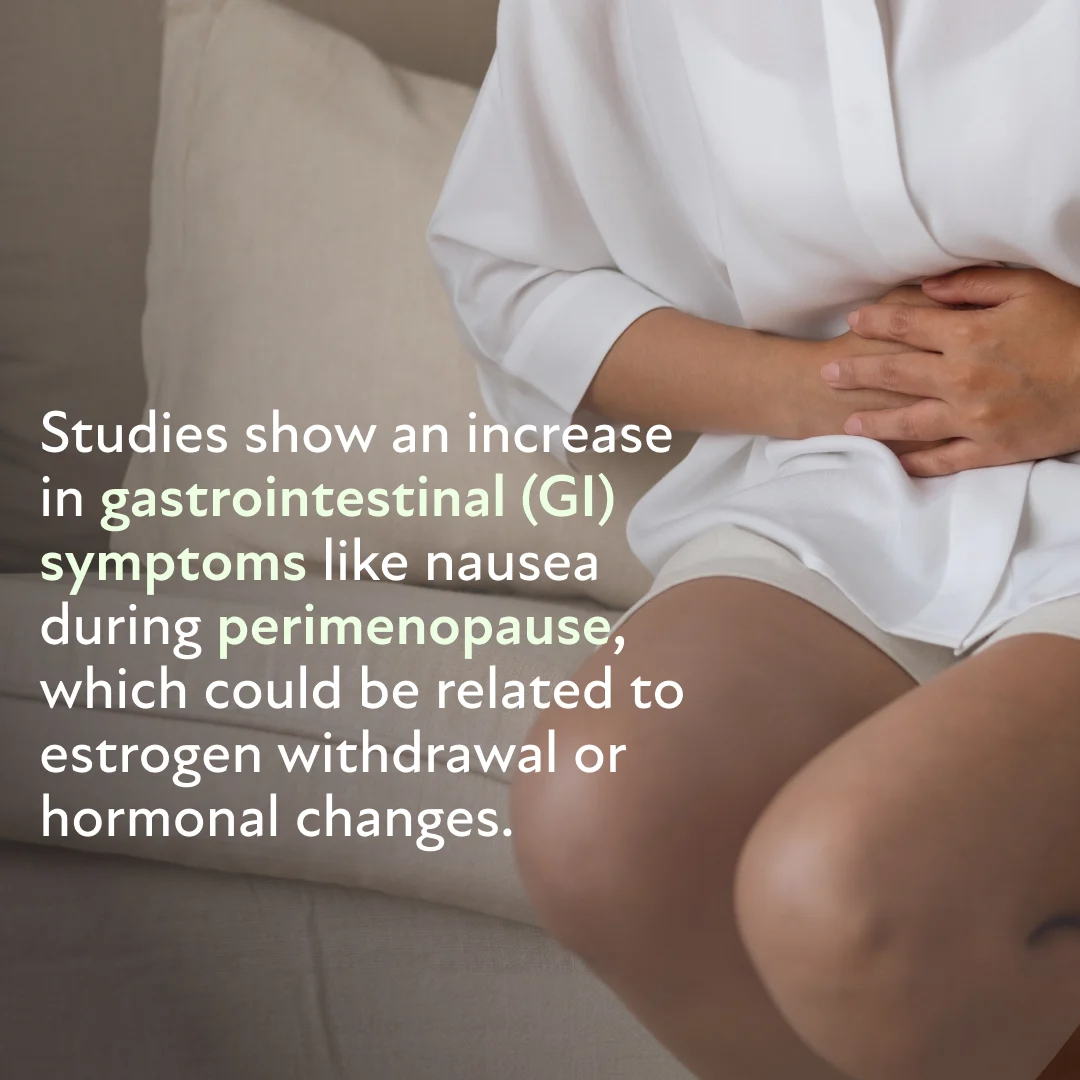Nausea is one of the most commonly reported symptoms in adults, with about 12% of people experiencing it at any given time. However, it’s a rare occurrence during the menopausal transition.(1)
While some women may experience occasional queasiness, especially if they’re also dealing with symptoms like hot flashes or anxiety, constant or severe nausea is unusual during menopause. If this occurs, it's prudent to consult a physician who can determine if there’s an underlying condition and recommend management strategies, such as dietary adjustments or medications, to alleviate the discomfort.
What is nausea?
Nausea is a subjective sensation often described as queasiness or an unsettled feeling in the stomach. It may or may not be followed by vomiting. Experts suggest that nausea is a defense mechanism to eliminate toxins or harmful substances like bacteria or viruses.(2)
Is nausea a symptom of menopause?
While nausea is not a common symptom during the menopausal transition, some women might experience it due to hormonal fluctuations. Other menopausal symptoms, like hot flashes and anxiety, may also trigger nausea.
Nausea may be associated with other symptoms during menopause:(3)
Sweating
Excessive salivation
Dizziness
Headache

Causes of Menopause-Related Nausea
Menopause-related nausea is typically attributed to hormonal fluctuations, other menopausal symptoms, and certain medications.
Hormonal Imbalance
Fluctuations in hormones like estrogen and progesterone can trigger nausea in some women. Changes in these hormones can also affect the normal functioning of the digestive system, which may cause bloating, indigestion, and heartburn. These digestive symptoms are more likely to cause nausea.
Other Menopausal Symptoms
Some menopausal symptoms can cause nausea:(3,4)
Hot flashes: Research indicates that up to 5% of women suffering from hot flashes experience nausea as a side effect.
Depression and anxiety: Nausea is often associated with mood changes, as these symptoms can disrupt the digestive system.
Neurological and cardiovascular changes: Hormonal decline can cause dizziness and light-headedness, which may result in nausea.
Migraines: Menopausal migraines often cause nausea and vomiting.
Stress and fatigue: These symptoms trigger the release of hormones like cortisol that can impact the digestive system, leading to nausea and an upset stomach.
Menstrual cramps: Severe menstrual cramps can increase sensitivity to pain and stomach discomfort, contributing to feelings of nausea.
Medications Side Effects
Antidepressants are often prescribed during menopause to manage symptoms like mood swings and depression, but they may cause nausea as a side effect.(3) However, as nausea can have various causes, a symptom diary can help pinpoint the trigger. For example, if nausea starts after beginning a new medication, the medicine is likely the cause.
Hormonal treatments (HRT)
Many women benefit from HRT as it helps manage most menopausal symptoms, but it can sometimes cause nausea. This can often be fixed by adjusting the dose, switching to a different type of HRT, or changing how it's taken. A physician can help find the best solution.(5)
How can women deal with menopause-related nausea?
Here are some tips to minimize and prevent nausea during menopause:
Avoiding Certain Foods and Beverages
Nausea triggers can vary, but some common ones include the following:(6)
Alcohol
Spicy, sweet, or greasy foods
Hot foods and beverages
Foods with strong odors, like fish and onions
Caffeinated drinks like coffee and tea
Eating Foods That Are Easy on the Stomach
Studies suggest certain foods are easy to digest and help manage nausea:(6)
Cold foods like popsicles, pudding, yogurt, and gelatin
Bland, starchy foods like toast, rice, plain pasta, crackers, and pretzels
Ginger-containing foods and beverages like ginger tea
In addition, smaller meals are lighter on the stomach. So, experts suggest eating five to six small meals throughout the day instead of three large ones.(6)
Managing Hot Flashes
Since hot flashes are linked to nausea, it's best to prevent them by:
Avoiding known triggers like spicy foods and hot drinks
Drinking plenty of water
Wearing clothes made of breathable fabrics like cotton
Keeping the bedroom cool at night with the help of an air conditioner or fan
Managing stress through relaxing activities like meditation
Exercising daily, preferably outdoors when it's cool
Quitting smoking
Medications
Many antiemetics are available and prescribed based on the cause of nausea:(5)
Serotonin blockers work by blocking serotonin, a chemical in the brain that can trigger nausea. Examples include ondansetron, granisetron, and dolasetron.
Dopamine blockers help by blocking dopamine, another chemical that induces nausea. Some common examples are chlorpromazine, prochlorperazine, and promethazine.
NK-1 receptor blockers, as the name suggests, block the NK-1 receptor, which is associated with nausea. Common options are aprepitant and fosaprepitant.
Steroids help reduce inflammation that can lead to nausea. Commonly prescribed steroids are dexamethasone and methylprednisolone.
Benzodiazepines prevent anxiety-related nausea. Examples include alprazolam and lorazepam.
Hormone Replacement Therapy
HRT works by replacing the hormones that decline during menopause, primarily estrogen and progesterone. It can also help manage nausea by relieving menopausal symptoms that can trigger nausea, like hot flashes and anxiety.
There are different types of HRT available to suit individual needs:
Estrogen-only HRT: Typically prescribed for women who have had a hysterectomy
Combined HRT: Contains both estrogen and progesterone and recommended for women who still have their uterus to prevent the risk of endometrial cancer from estrogen-only therapy
Local estrogen: Available as creams, rings, or tablets, primarily used to treat vaginal and urinary symptoms
Experiencing menopausal nausea? Discover if HRT is right for you.
If you’ve entered the menopause transition and are struggling with nausea, you don’t have to suffer in silence. Take our brief menopause quiz to see if you’re an eligible candidate for HRT. Get started with Winona to take the first step toward feeling better.